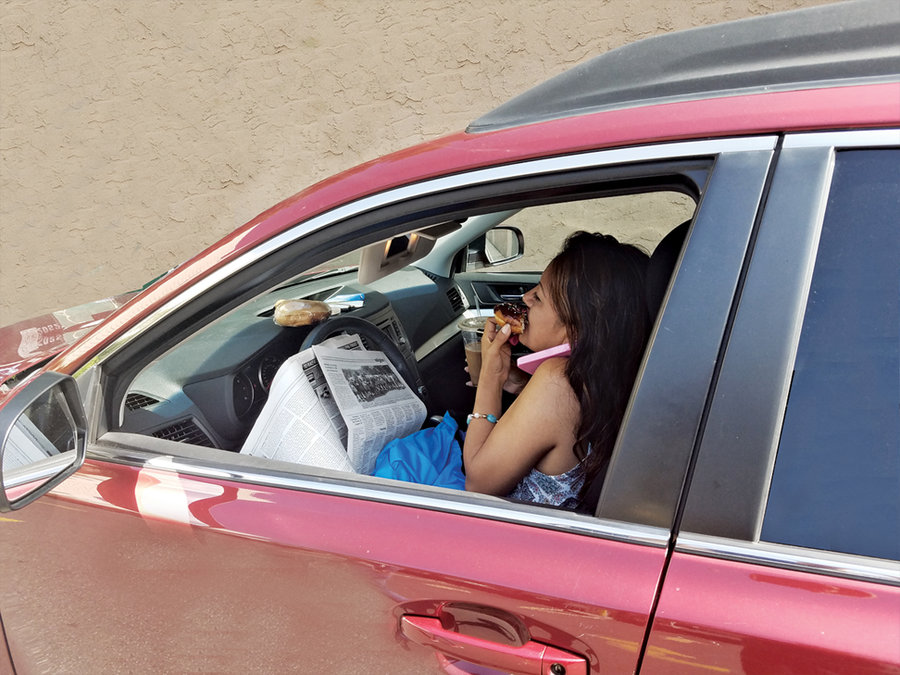Assemblyman Nicholas Chiaravalotti of Hudson County recently sponsored a bill that has been interpreted in some media outlets as banning drinking coffee, polishing your nails, or reading a newspaper while driving.
The actual language is more vague: the proposed bill, sponsored with John Wisniewski of Middlesex County, prohibits “any activity unrelated to the actual operation of a motor vehicle” that interferes with safe driving on public roads.It was introduced in the state Assembly earlier this year and has been sent to a committee for technical review.
Distracted driving has been a major contributing cause for 800,000 motor vehicle crashes in New Jersey between 2010 and 2014, according to a report from the Division of Highway Traffic Safety. Distracted driving was the cause of 3,179 traffic fatalities in 2014, and has become a greater hazard than drinking, according to the report. Phone use while driving is now the leading cause of death for teen drivers, according to a 2014 Insurance Institute for Highway Safety (IIHS) report.
New Jersey would become the third state to enact comprehensive distracted driving laws. This one was modeled after a law passed in Maine in 2009, which imposed similar fines. In 2014, Maine Gov.Paul LePage said that fines were not working to help curb the problem and proposed license suspension in addition to fines, which this bill does as well.
Penalties for the first offense would be between $200 and $400; $400 to $600 for the second; and $600 to $800 for the third, along with points on the license and a 90-day suspension.
Interpreting the law
Already, New Jersey has laws prohibiting cell phone use, both texting and talking, and using hands-free devices. Chiaravalotti said his proposed bill is meant to build on those existing laws while focusing more on the dangers of multitasking behind the wheel.
“I wouldn’t be able to function without a coffee in the morning while I’m on the road,” Chiaravalotti admits.
He noted that he has a “6-year-old who points out when I’m trying to tie my tie, drink a bottle of water, or change the radio station [while driving].”
Still, he said, “I’m hoping with all the publicity, we can have a conversation about multitasking, and for people to take a step back and think about all the things they do while operating a vehicle. It’s a major problem.”
Cathleen Lewis, Director of Public Affairs for AAA Northeast, said the legislative strategy up until now to curb distracted driving has been to ban the use of technology, namely cell phone use, instead of getting to the root cause, which she says is distracted behavior. “This isn’t about banning people from drinking coffee,” she said. “This is about understanding bad behavior.” She said a lot of that behavior is caused by a “false sense of comfort and safety when traveling in a car.”
“Obviously, there are some things you just shouldn’t do. Newspapers? No, that’s dumb.” – Joe Hernandez
____________
The multitasking myth
“There is a false understanding that it’s the phone that’s the dangerous piece,” she said,“but really it’s the fact you are engaging in a complicated decision-making behavior that is taking your mind off the roadway.” According to numerous studies by the American Psychological Association, human attention has a limited capacity, and the idea that the human brain can focus on multiple tasks at once is fallacious. For every task a driver attempts in addition to just driving, his or her visual periphery range decreases, increasing his or her risk of a motor accident, according to the National Safety Council.
Even if the driver is doing something as benign as using a hand-free device to talk on the phone, or eating a quick snack on the commute to work, the chances of crashing increase significantly, putting both the driver and every person who shares the road with that driver at a greater risk.
A recent American Automobile Association study shows that drivers are distracted up to 27 seconds after sending a text, even if that text is sent at a stoplight.
Voices from the community
In a state that collected $405 million in traffic tickets in 2015, many feel that laws like this one are overbearing.
“This is just another reason to pull us over,” said Uber driver Joe Hernandez, 35, of Jersey City. “We all have to do other things in the car. I have to be on my phone a lot in the car, and I’ve seen cops eating, drinking, everything in the car.” He admits though, “Obviously, there are some things you just shouldn’t do. Newspapers? No, that’s dumb. You’re just asking to get in an accident.”
Sarah Nesheiwat, 21, of Bayonne, says her cousin recently spilled coffee in the car while driving and bent over to wipe it up while driving. “I told her all the time to drink that coffee at home before you get in that car.” She says she’s seen drivers in all kinds of distracted situations, from putting on makeup to munching on snacks.
Maybe it’s because of her recent driving training that she insists that any activity other that driving can be accomplished before or after driving. “What’s so hard about that?” she asked.
Rory Pasquariello may be reached at roryp@hudsonreporter.com.
